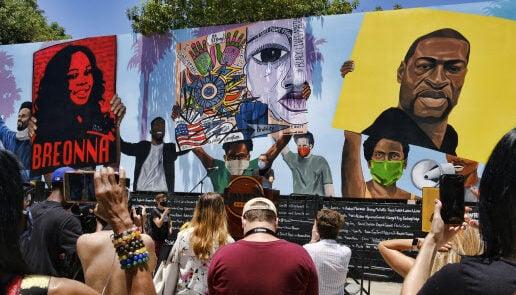Africa-Press – Mauritius. When news of COVID-19 reached the non-scientific world, there was panic and surprisingly, hope. Optimists saw this global crisis as an opportunity for people to empathize and connect based on our shared humanity.
As heartwarming videos of quarantined Europeans singing on balconies went viral, for a brief moment, this idea seemed possible. Yet instead of uniting us, in many ways, the pandemic has highlighted differences and inequities.
Low-income and minority communities have been hardest hit. Due to centuries of systemic oppression, marginalised communities around the world are in vulnerable positions in health and the economy.
The pandemic has not stopped police from treating black people as animals. The murders of Breonna Taylor, George Floyd, and Ahmaud Arbery showed that even during a global health crisis, police officers are murdering black people with a sense of impunity.
Today, people of all backgrounds are demanding racial justice and equality. However, can this new global consciousness help end class, income, and racial discrimination for good?
For the first time, it is now trendy to support black lives. According to the Washington Post, today more white Americans support the Black Lives Matter movement (54 percent) than those who approve of President Donald Trump (41 percent).
The rising awareness of racial injustice is not only happening in the United States. All over the world, the recent police killings of black people have forced individuals to take a look at the systemic racism in their own countries.
In France, for example, which hosted multiple demonstrations after the murder of George Floyd, many recalled Adama Traoré, a Malian-French man who died in police custody in 2016.
This reflection is also taking place in Africa as Kenyans and South Africans demand justice for victims of police brutality, specifically those killed and wounded during strict COVID-19 lockdown measures.
Today’s demonstrations against racial injustice are bigger and more diverse than ever before, despite the pandemic. Technology has been a big help, as people encourage their networks to spread information globally, donate and attend protests.
As uplifting as this mass social awareness has been for many black people, for others, it is suspicious. Dana Osei, a Ghanian-American student at the Massachusetts Institute of Technology (MIT), questions the rise of digital activism among her white friends.
According to her, “the majority of it is probably performative”. She is not alone in her concerns. The new wave of online digital activism has struck many as almost too easy.
From posting a black square for a couple of hours (#blackouttuesday) or simply putting #blacklivesmatter as a caption for a vacation photo, the bar for being an online activist is low.
Despite encouraging surface-level advocacy, this new global consciousness partnered with rise of technology offers black people the opportunity to form stronger and more effective political alliances across the globe.
It’s similar to how in the 1960s, African and African-American activists partnered in political and artistic campaigns helping lead to the end of oppressive codes like Apartheid, these partnerships would guarantee a mutual defense against racism and oppression.
Stronger black political alliances could also be the push needed to tackle pressing issues such as capital flight from Africa. Each year about $100 billion leaves Africa in illicit financial flows – via tax evasion and contract overpricing schemes – to end up in tax havens controlled by European states or the US.
Often the US Department of Justice of the SEC in New York earns far more in fines from prosecutions of companies involved in capital flight than the African countries from which the resources are stolen.
Stopping this theft of resources requires political will and clear strategies such as lawyers filing class actions on behalf of communities deprived by these corrupt schemes.
Strong alliances from black attorneys, politicians, and activists across the globe could put more pressure on Western nations to return these funds directly to Africa.
Such black international alliances could also push for investigations into corporate wealth. Many Western companies have benefitted from the enslavement of Africans, such as J.
P Morgan Chase and the Bank of England. Similarly, technology giants, like Apple and Tesla, have been accused of mistreating African labourers. This blatant exploitation of black people from major corporations is not just an American or African problem.
It is happening all around the world and must be addressed by united efforts. The fight for reparations from Western governments to disenfranchised black communities is another cause that could stand for stronger international support among black people.
Whether it is the return of stolen African artifacts or direct financial compensation, united efforts from black organizations could hold powers that have divided, exploited, and oppressed black nations for so long accountable. Cross-continental partnerships can expand beyond political activists. Black people have more clout today than ever before.
Efforts from billionaires like Aliko Dangote and celebrities like Beyoncé and Jay-Z, to call out oppressive policies or unethical practices from corporations could be used to raise social consciousness and pressure governments and corporations.
Outside of politicians and billionaires, black students also have a part to play on this road to true equality. The “Rhodes Must Fall” movement in 2015 started by students at the University of Cape Town is an excellent example of an international black alliance.
As students fought to have Cecil Rhode’s statue removed from their campus, black students in English universities like Oxford University began the same mission.
This movement led to the fall of many oppressive statutes around the globe and demonstrated the power of organized, global efforts from black youth. The fight against racism in education is far from over. There is a misreading of African history that perpetuates white supremacist ideas and stifles Africans from combatting the oppression they face.
Like the Rhodes Must Fall movement, it will take a global effort from students, activists and intellectuals educators to rethink and open up debate over the curriculum covering the history of Africa and its Diaspora, and its relations with the rest of the world.
In the time of a pandemic, these alliances are even more necessary. Western nations are stockpiling life-saving treatments while patented pharmaceutical companies are prioritizing wealthy nations in vaccine distribution.
Black communities could become even more vulnerable. Only African leaders and healthcare experts who understand the implications of COVID-19 on African countries, as well as the value of African lives, can call out these practices as immoral.
Thankfully, black alliances are already taking shape. Just last month, after connecting online, over 100 African writers signed a letter condemning violence against black Americans.
The letter emphasized that no matter the historical or cultural differences, African authors stand with those in the US hit by racial violence. Endorsements like these are essential in showing that no black community stands alone in the face of racial injustice. Just like during Apartheid, the world is watching.
Creative organizations like Afropunk, a music festival and activist group for black creatives, and Afronation, an African music festival hosted in different locations across the globe, are using their digital platforms to create international communities for black people and promote activism.
Black people and their allies can prove COVID-19 optimists right by using this opportunity to connect and advance our communities. Together, we can address the injustices this health crisis has exposed and combat the pandemic of racism that plagues our world.
For More News And Analysis About Mauritius Follow Africa-Press







